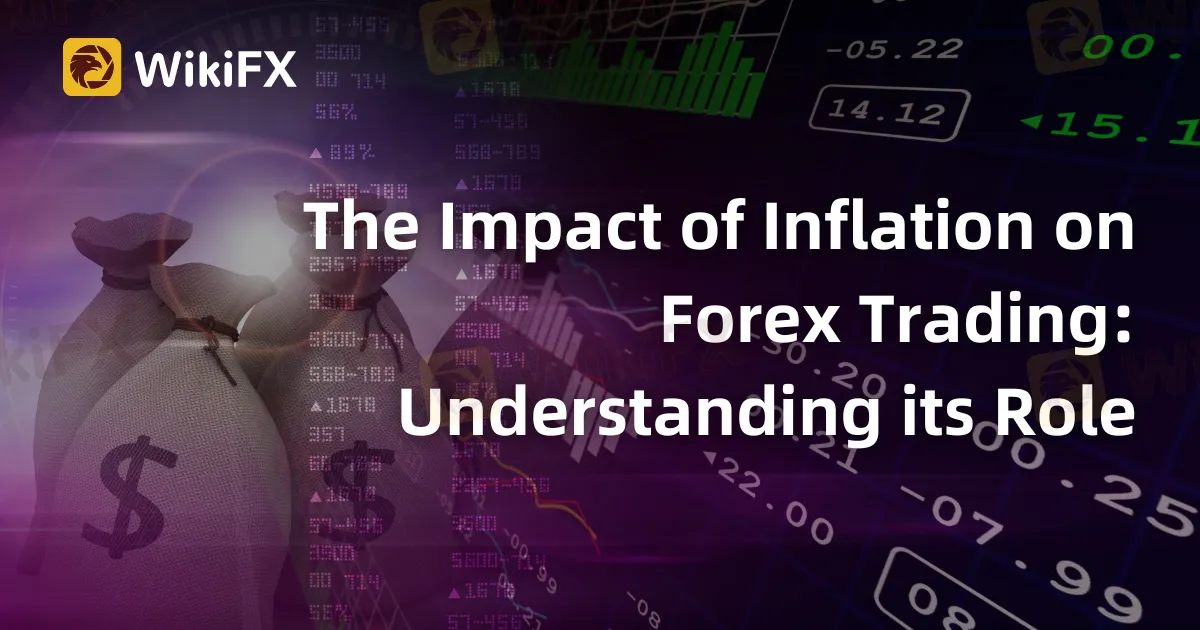简体中文
繁體中文
English
Pусский
日本語
ภาษาไทย
Tiếng Việt
Bahasa Indonesia
Español
हिन्दी
Filippiiniläinen
Français
Deutsch
Português
Türkçe
한국어
العربية
The Impact of Inflation on Forex Trading: Understanding its Role
Abstract:Inflation is the rate at which the general price level of goods and services in an economy rises over time. In this article, we will discuss the role of inflation in forex trading.

Forex trading, or foreign exchange trading, is the buying and selling of currencies in the global financial market. One of the most significant factors that affect forex trading is inflation. Inflation is the rate at which the general price level of goods and services in an economy rises over time. In this article, we will discuss the role of inflation in forex trading.
Inflation affects forex trading in two primary ways: it influences the value of a currency in the global market, and it affects the monetary policy of a country. Let's take a closer look at each of these factors.
First, inflation affects the value of a currency in the global market. A country with a high inflation rate typically has a currency that is weaker relative to other currencies. This is because when there is a high inflation rate, the purchasing power of that currency decreases. For example, if a country's inflation rate is 10%, then the cost of goods and services in that country will increase by 10% each year. As a result, the currency's value decreases, and the exchange rate between that currency and other currencies will be affected.
WikiFX top Forex brokers based on their regulation status and reviews






On the other hand, a country with a low inflation rate typically has a stronger currency. This is because the purchasing power of the currency remains relatively stable over time, which makes it more attractive to investors. In forex trading, traders will look at a country's inflation rate as an indicator of the country's economic health. A high inflation rate may signal that the economy is struggling, while a low inflation rate may indicate that the economy is strong.
Second, inflation affects the monetary policy of a country. Central banks use monetary policy to control inflation and stabilize the economy. When inflation is high, central banks may raise interest rates to reduce the money supply and cool down the economy. This is because high inflation can lead to hyperinflation, which can have devastating effects on the economy. Hyperinflation can lead to a rapid decrease in the value of a currency, which can make it difficult for businesses and consumers to purchase goods and services.
The Impact of Central Bank Interest Rates on Forex Trading
When central banks raise interest rates, it can make a country's currency more attractive to foreign investors. This is because higher interest rates can provide a better return on investment. As a result, the demand for that currency may increase, which can increase its value relative to other currencies. On the other hand, when central banks lower interest rates, it can make a country's currency less attractive to foreign investors. This is because lower interest rates can provide a lower return on investment, which can decrease the demand for that currency and decrease its value relative to other currencies.
In conclusion, inflation plays a critical role in forex trading. It affects the value of a currency in the global market and the monetary policy of a country. Forex traders need to monitor inflation rates to determine the strength of a country's economy and the potential impact on currency values. As a forex trader, it is important to stay up-to-date with the latest news and economic indicators to make informed trading decisions. By understanding the role of inflation in forex trading, traders can develop effective trading strategies that take into account the impact of inflation on currency values.
Install the WikiFX App on your smartphone to stay updated on the latest news.
Download link: https://www.wikifx.com/en/download.html?source=fma3

Disclaimer:
The views in this article only represent the author's personal views, and do not constitute investment advice on this platform. This platform does not guarantee the accuracy, completeness and timeliness of the information in the article, and will not be liable for any loss caused by the use of or reliance on the information in the article.
Related broker
Read more

Bank Negara Malaysia Flags 12 New Companies for Unauthorised Activity
Bank Negara Malaysia (BNM) has updated its Financial Consumer Alert List (FCA List) by adding 12 more entities, reinforcing its efforts to warn the public against unregulated financial schemes. Check if your broker made the list!

TradingView Brings Live Market Charts to Telegram Users with New Mini App
TradingView has launched a mini app on Telegram, making it easier for users to track market trends, check price movements, and share charts.

March Oil Production Declines: How Is the Market Reacting?
Oil production cuts in March are reshaping the market. Traders are closely watching OPEC+ decisions and supply disruptions, which could impact prices and future production strategies.

How to Calculate Leverage and Margin in the Forex Market
Leverage amplifies both potential profits and risks. Understanding how to calculate leverage and margin helps traders manage risks and avoid forced liquidation.
WikiFX Broker
Latest News
The Withdrawal Trap: How Scam Brokers Lure Victims into Paying More
FCA to Investors: Think Twice Before Trusting These Brokers
Trump\s tariffs: How could they affect the UK and your money
Trump gambles it all on global tariffs he\s wanted for decades
TradingView Brings Live Market Charts to Telegram Users with New Mini App
Trump tariffs: How will India navigate a world on the brink of a trade war?
IG Group Acquires Freetrade for £160M to Expand UK Investment Market
U.S. March ISM Manufacturing PMI Released
Should You Beware of Forex Trading Gurus?
Exposed by SC: The Latest Investment Scams Targeting Malaysian Investors
Currency Calculator







